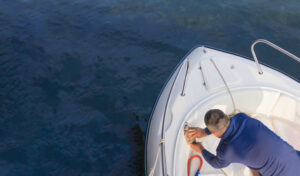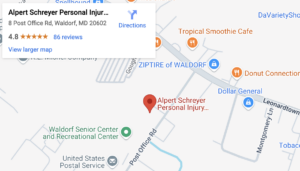
If you are reading this – you were probably injured while working in a maritime occupation. We know how catastrophic a maritime occupation accident can be. Your injuries may be causing you to miss work while you heal. You may be worried about your medical bills. You might be anxious about your future.
When you are injured while performing a maritime job – you owe it to yourself to find out if you are owed financial compensation. Handling this on your own can feel overwhelming- but we can help.
The Maryland maritime law attorneys at Alpert Schreyer Personal Injury Lawyers can support you through this tragic circumstance. Our lawyers offer free legal consultations to answer all your questions. We vow to work and fight tirelessly to get you the compensation you deserve.
We will handle all the complicated legal elements of your maritime law case. We want you to focus your energy on one thing – getting healthy again.
If you’re hesitant to reach out because you’re worried about the cost – your worry ends here. We will cover all the upfront maritime injury case expenses. Our law firm works on a contingency fee basis. You won’t be responsible for paying us until we’ve won your case. Contact us to learn more about how we can help.
Act quickly to protect the value of your maritime claim. The insurance company will have an advantage if you wait too long. They are gathering evidence to deny your claim as you read this. Remember – the insurance company isn’t your friend – even if they sound nice on the phone. They are only calling you to decrease the value of your settlement. Let our Maryland Maritime law attorneys handle these calls for you.
Contact us at (301) 932-9997 to schedule your free case evaluation. Call Alpert Schreyer Personal Injury Lawyers today.
Injured on a Boat, Dock, or Rig? We Are Here to Help.

If you work on or around the water, on a boat, or on a dock, you engage in dangerous work. Accidents in maritime occupations are common, and many of these injury-inducing accidents are the direct result of employer negligence. Maritime law—a specialized area of the law—governs these accidents and injuries. If you suffered an injury while working on or around the water, on a boat, or on a dock, you need an experienced Maryland maritime injury attorney at Alpert Schreyer Personal Injury Lawyers, to guide your claim toward its best possible resolution.
Common Maritime Accidents
A variety of injury-inducing accidents are common to maritime work:
- Falling overboard: Falling overboard doesn’t refer just to falling overboard while at sea, it also refers to falling overboard while docked—falling in between vessels, for example. These accidents prove exceedingly dangerous not only for the victims but also for the rescue crews.
- Slip and fall accidents: Slip and fall accidents are among the most common accidents in any occupation—from desk jobs to construction work—and they’re no stranger to maritime work. Boats’ decks and docks aren’t just occasionally wet (and thus more slippery)—they’re almost always wet, and because they’re exposed to open water and weather, they’re constantly worn down, which can lead to dangerous cracks, slick and uneven surfaces, and other tripping factors. Slip and fall accidents that occur on or around the water, boats, or docks become especially dangerous.
- Toxic fumes in enclosed spaces. Maritime work often entails toiling in small and enclosed spaces, including cargo areas, access routes, and storage rooms. When these enclosed spaces fill with the toxic fumes that accompany maritime work, the results are dangerous and can prove deadly.
- Dock and pier accidents. Maritime work includes loading and unloading massive cargo, walking gangways, working with heavy equipment, and performing many other dangerous tasks, all of which make dock and pier accidents extremely common and dangerous.
If a maritime accident injured you, you need a skilled maritime injury attorney. Such accidents are serious, and your rights and rightful compensation are too important not to aggressively advocate for your claim’s best possible resolution. At Alpert Schreyer Personal Injury Lawyers in Maryland, we have the experience, drive, and commitment to help navigate your claim toward just compensation.
The Laws of the Land & Sea
The laws that govern them make maritime accidents more complicated than those that take place on land.
Several federal laws, however, protect the men and women who work on or near the water:
- The Jones Act: The Jones Act is a federal statute that protects maritime workers who suffer job-related injuries due to employer negligence. The Jones Act specifically protects seamen who work on the crew of a vessel, and while these terms aren’t specifically delineated, they’ve come to represent nearly anyone who works on the water in some capacity. Employers are responsible for protecting their employees from harm while on the job, and this entails maintaining safe work environments, providing employees with appropriate safety gear and adequate safety training, and ensuring the good maintenance and proper functioning of all relevant equipment. A maritime employee injured when an employer fails to uphold these important responsibilities can hold the employer legally responsible.
- The Longshore Harbor and Workers’ Compensation Act. The federal government put the Longshore Harbor and Worker’s Compensation Act (LHWCA) in place to cover maritime workers that the Jones Act didn’t cover. This law extends to longshore workers, shipbuilders, ship repairers, shipbreakers, harbor construction workers, and any other traditional maritime workers who work on the navigable waters of the United States or on any adjoining areas, including loading and unloading zones, piers, docks, terminals, and wharves.
- Death on the High Seas Act. The Death on the High Seas Act allows the families of maritime workers to receive compensation when they lose a family member to an accident on the high seas that someone else’s negligence caused. This act covers not only financial damages but also psychological and emotional suffering. To qualify as “on the high seas,” the vessel must travel at least three miles off shore while still remaining in the United States.
In addition, if you’re a maritime worker who was injured on the job, you’re legally entitled to receive maintenance and cure while you go through the recuperation process. Maintenance and cure benefits cover your medical costs and daily living expenses while you recover.
Safety First
If you’re a maritime worker, your employer is responsible for providing you with a safe work environment. Not to do so is considered negligence on your employer’s part.
Such negligence can present in many ways, including:
- Inadequate job training and inadequate safety training (both of which are critical to maritime work)
- Failure to maintain, perform safety checks on, and repair equipment
- Failure to apply non-skid treatments to decks and other walking surfaces, clean them of debris, maintain them, and frequently check them for safety
- Failure to heed warnings of adverse weather and rocky waters (and thus place maritime workers at unnecessary risk)
- Failure to adhere to working schedules that allow maritime workers to get adequate rest, sleep, and work breaks (and thus endangering everyone on the vessel)
Maritime work is obviously dangerous, but your employer’s direct responsibility is to keep the work conditions as safe as possible—within rigid federal guidelines.
If You Were Injured, Contact an Experienced Maryland Maritime Injury Attorney Today
Maritime law is complicated and maritime work is dangerous—that’s established. If a maritime accident injured you, however, your rights matter and you need experienced legal counsel.
At Alpert Schreyer Personal Injury Lawyers, our dedicated Maryland maritime injury attorneys have the experience, commitment, and determination to help guide your claim toward just compensation. We represent people—not corporations or insurance companies.
From our base near the Chesapeake Bay, we have six convenient locations in Maryland. We are prepared to press state and federal cases involving marine personal injury, wrongful death, manufacturing, and collision cases arising under the Jones Act, the Death on the High Seas Act, the Longshore Act, the Outer Continental Shelf Lands Act, and general maritime law.
We can aid a wide variety of maritime clients, including marine construction workers, dredgermen, divers, merchant seamen, tugboat hands, fishermen, longshoremen, shipyard workers, and cruise ship passengers.


